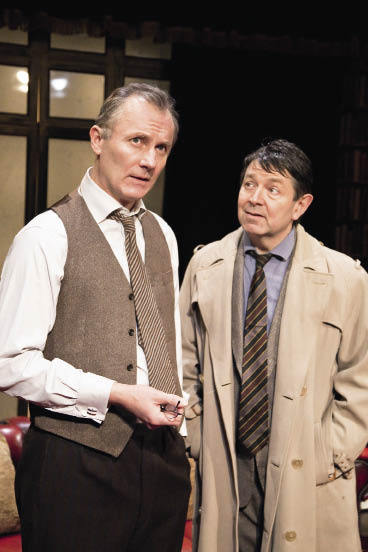The teeny-weeny Bush Theatre is grappling with the monster of the free schools debate. In Little Platoons by Steve Waters the issues are laid out rather simplistically, naively even, which is perhaps just as well with undereducated dimwits from London comps, like me, in the audience. The pivotal character is a disaffected music teacher, Rachel, who rabidly opposes the free school movement until she’s offered the headship of a zingy new academy whereupon, hey presto, her scepticism morphs into passionate support.
Waters claims to be moderating the discussion as a disinterested umpire but his impartiality is, shall we say, only partial. He represents the pro-comp camp through the figure of Martin, an embittered left-wing headbanger who boasts that he has a doctorate in ‘public housing’. (Cue sniggers of contempt from arty west London crowd.) Nasty little Martin chucks his wife and shoves off to Oxfordshire to get his son into a leafy grammar and occasionally pops back to Shepherd’s Bush to undermine any improvements to the comp he dumped. Clearly, we’re invited to revile this fatuous bundle of self-regarding truculence (well played by Richard Henders, looking not unlike an ill-shaven John Bercow), and we’re encouraged to cheer on Nick, the caustic, super-brainy maverick who wants to slice through the cant and set up an education system that’s capable of educating people.
Significantly, it’s Nick who articulates the best arguments of his soft-left opponents. Their principled view is that ‘money’, or financial Darwinism, must be kept separate from education at all costs even if it means wrecking the system. By giving this speech to Nick, rather than to Martin, Waters seems to be hinting that the pro-comp camp, who are highly educated, are also too dim to analyse their own ideology and are thus condemned to remain its captives.
This is a riveting, if somewhat ramshackle play which crams too many issues and conflicts into its two-hour span. Some of the asides have real bite. Nick Clegg is described as ‘looking like the bass player in a Christian band’. Nathan Curry’s taut production features excellent ensemble work. Pick of the cast is Andrew Woodall as the rangy, abrasive and charismatic Nick, who sets out to rescue the education system from the small-c conservatives and capital-l Luddites who want to entrench failure and promote ignorance in the name of a perverted philanthropy they scarcely understand. But don’t worry if you miss this show. The script is bursting at the seams and deserves to relax its waistline into the more ample suitings of a mini-series. And the BBC TV centre is just up the road.
In Earls Court, the Finborough Theatre has struck gold. There’s no other word for this overlooked treasure by Emlyn Williams. Set in the 1950s, Accolade opens with Will Trenting, a noted author in his middle years, receiving a knighthood for services to literature. But Will has a secret. Twice a year he likes to slope off to the pubs of Rotherhithe to carouse and fornicate with hookers and criminals. His wife indulges his alter ego partly because she loves him and accepts him for what he is, and partly because his tart-wreathed sabbaticals supply the material for his novels and form the basis of his wealth and success and their plush life in a Regent’s Park mansion.
On the eve of his trip to the Palace, Will’s brothelsome habits catch up with him. Lewd snapshots of him starring in a Thameside orgy arrive in the hands of a peeping tom demanding cash. The action turns on Will’s struggle to defeat his blackmailer and keep his adoring family together.
Doubtless this will sound terribly old-fashioned. And so it is. This is ‘a well-made play’, one of those terms of approval which was mysteriously converted into a putdown by absurdists and post-modernists and other bores. The structure of this script is simply exquisite. And that doesn’t mean one spends any time admiring it. Rather the opposite. By artfully concealing its folds and intricacies it keeps one in delicious agonies of suspense throughout. It’s impossible to know when or from where destiny will deliver its next cruel blow. The ‘well-made play’ turns out to be a simplification, a gloss for something far more sophisticated: a family tragedy taking the form of a thriller.
Aden Gillett brings a wonderful sense of grace and fragile nobility to the lead role. Saskia Wickham is terrific as his long-suffering, big-hearted and mighty-bosomed wife. As the teenage son, Patrick Osborne is marvellously convincing in a role he’s clearly too old for. And Graham Seed is sublime as the sweaty, dishevelled and ingratiating blackmailer. The Rattigan revival is now reaching its maturity. With this play Emlyn Williams pushes his way to the head of the queue and calls, ‘Me next!’







Comments